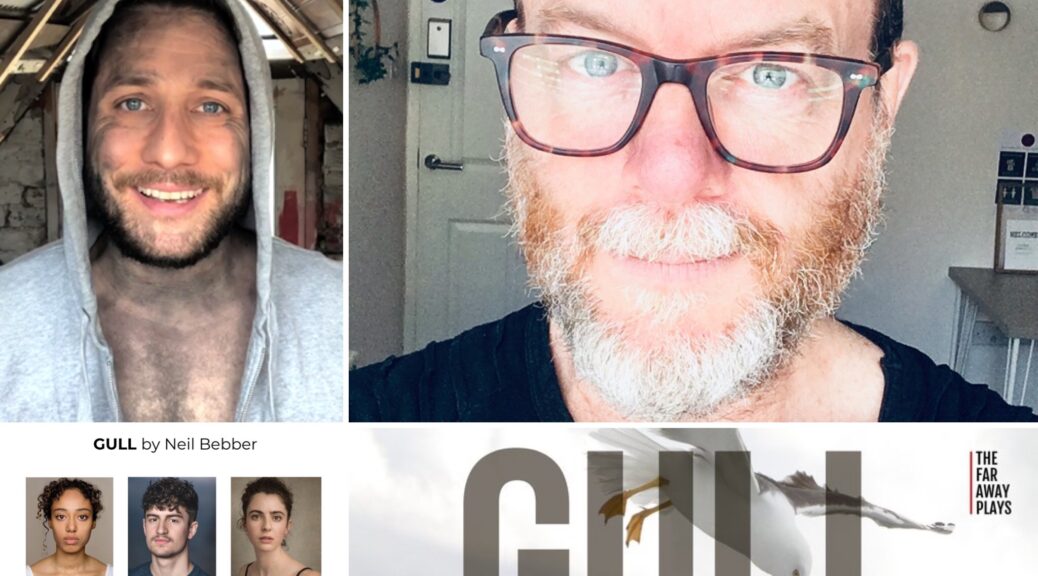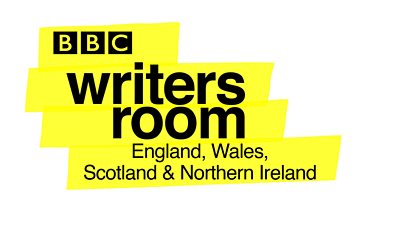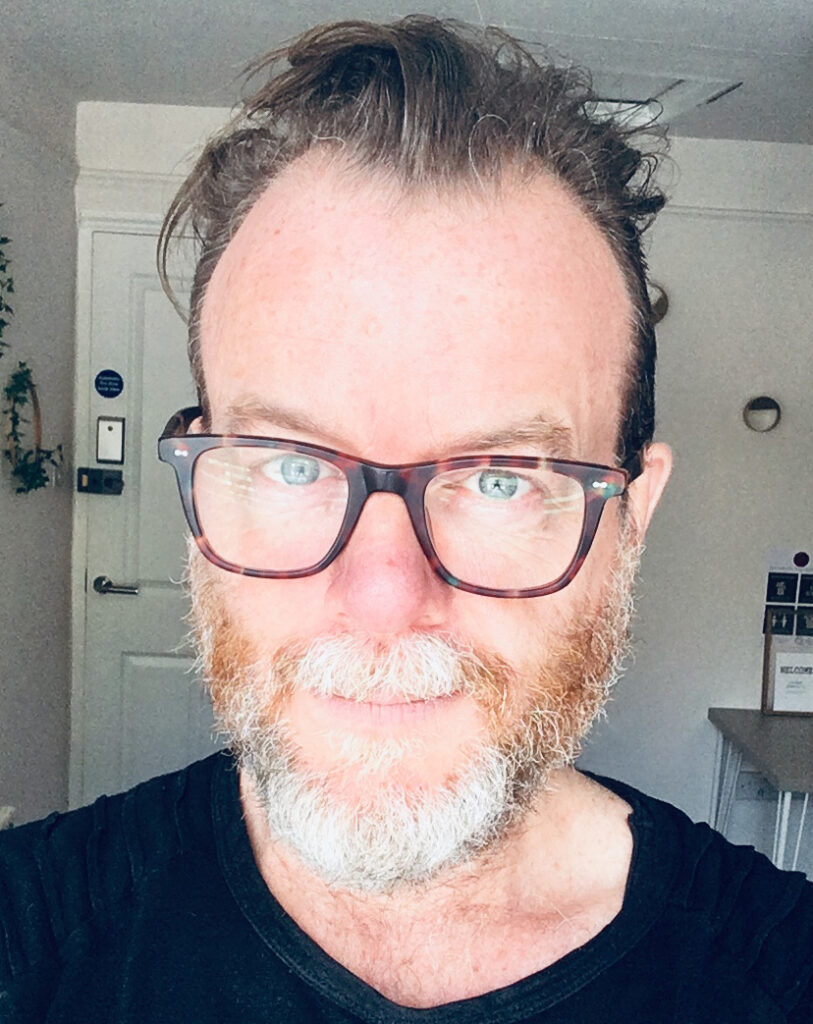
In our latest Playwright interview Director of Get the Chance Guy O’Donnell chats to Wales based Playwright Neil Bebber. Neil discusses his career to date, his latest project “Short Stories for Stressed Grown-Ups” and his thoughts on opportunities for Playwrights in Wales.
Hi Neil great to meet you, can you give our readers some background information on yourself please?
Hello! I’m a playwright, screenwriter, copywriter and graphic designer. I enjoy cycling, sea swimming, hiking at night under star-stuffed skies, endlessly scrolling though Netflix trying to find something good to watch, cooking (though my recent attempts at culinary genius have fallen short) and playing online Scrabble with strangers. For the record, I haven’t lost a game. Yet.
So, what got you interested in the arts?
Pantomime. Probably. I remember the feeling I had watching a school panto when I was maybe ten years old. The Seven Dwarves had left for the day to hi-ho off to work and Snow White was left alone in the space. A sequence followed where she just made the most of having the space to herself and I was transfixed.
From an early age, I was curious about the world. Talking to people as soon as I could talk. Asking “why” even more than most other kids. That question can take a child either way. Science allows us to understand how something works. The arts allow us to explore how something makes us feel. I’m a combination of the two. But, having turned down a potentially lucrative career in banking, in favour of a poorly-paid graphic design “apprenticeship” (that’s a whole other story!) I’d chosen my path.
Can you tell us about your writing process? Where do your ideas come from?
I used to fool myself into believing the romantic notion that I could only write when I was wallowing in a pool of self-indulgent pity, but I now realise that’s not true. I don’t know who said it, but writers write. So, the most important part of the process is to start by writing something.
It’s a cliché, but it is a muscle. And the more you do it, the easier it gets. And the more addictive it is. On the many courses I’ve been on, the forensic detail of process has been useful, but I’ve always got more from the automatic writing exercises. It’s a great way to unlock the unconscious mind and discover those seeds lurking in there between the teeth of doubt.
And I make a lot of notes. The romance of a notepad and fountain pen has been superseded by the iphone, but I’m glad that, should I ever hit a pothole on my bike and find myself flattened by an oncoming bus, nobody will ever get to access my notes. There’s a lot of strange musings there. Today I wrote a paragraph about how a crow, battered by the wind, seemed to be perfectly content to walk across the road sideways. And how that might serve as a metaphor. But I don’t know what for yet.
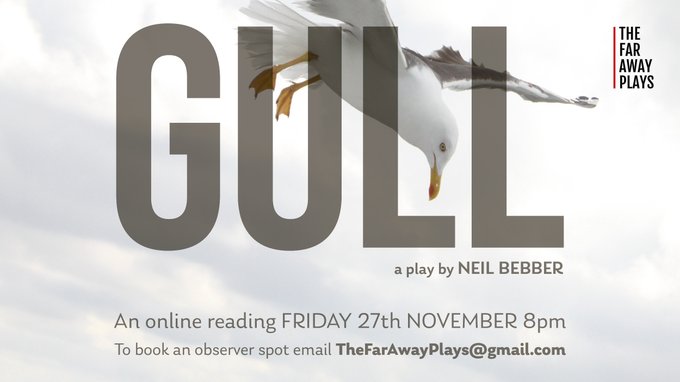
GULL, the play recently read on Zoom by the brilliant The Far Away Plays came about like that. A note about watching gulls rip apart bin bags and hungrily tuck into a pile of used nappies. The revulsion fed the atmosphere of the play.
In terms of dialogue, I believe that writing good dialogue is more about listening than writing. Before our freedoms were curtailed by a microscopic enemy, I used to sit in a lot of coffee shops, just listening to exchanges and watching people’s body language. In recent years, I probably haven’t been the best company, socially, choosing to observe and makes notes, rather than get involved.
Can you describe your writing day? Do you have a process or a minimum word count?
Writing days vary depending on the project. I’m also lucky enough to be able to supplement an artist’s income with commercial copywriting. But, either way, I start early. Check emails, social media between 8 and 8.30 and then make a start on the writing. At the moment I’m in the process of editing an audio play for a competition, writing a new speculative TV drama and also writing, recording and editing my stories for my YouTube channel, “Short Stories for Stressed Grown-Ups”.
Producing my own work has also made me realise the amount of time that’s needed for its design and promotion. The “Short Stories…” project needed to have an eye-catching brand, as well as accompanying visuals for each story. And all of this needs to be shared with the online world. I hope I’m finding the balance between, “oh, that’s interesting, I’m so glad he let me know” and “for God’s sake, not another post about his bloody stories!” If there’s anyone brave enough out there, do let me know!
Why and where do you write?
I write because I have something to say. About something I‘ve seen or something I’ve heard. Or something I feel passionately about.
I write because it’s a compulsion. A bit of an addiction. Especially when I get to see how an audience responds to it, good or bad. Maybe that’s some deep-seated need for validation. But then maybe that’s why any artist creates anything.
I write because it helps me repair. Relax. Forget. Make sense of a world (or of people) I don’t always understand.
I write because it’s satisfying and often surprising to be taken on a journey by imaginary characters, into unfamiliar scenarios and behaviours.
In terms of where I write, I can write anywhere. As long as I have something to balance a laptop on and a reasonably comfortable chair to sit on, I can write. There’s no ritual, no lucky desk or chair of inspiration. So, the photo is of a number of places where I could easily write. And the list is always being added to…
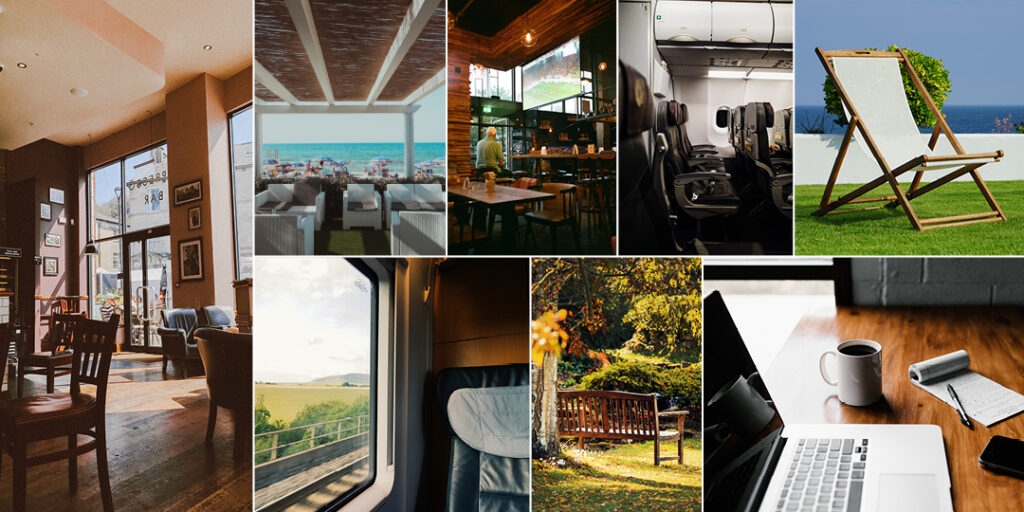
You are a prolific writer working across multiple mediums and forms. How has the Covid-19 Pandemic affected you and your creative process?
It was clear from the beginning that the lockdown, and the continuing response to a global pandemic, was going to fundamentally change a world that relied on the physical gathering of human beings in close proximity, whether audience or performer.
But, pretty early on, I saw an opportunity to get work out to a wider audience. Admittedly, it’s not the same experience as sitting in a studio theatre, tightly-packed with an appreciative audience, breathing the same air and having a collective experience.
When Jordan Bernarde contacted me about re-staging BREATHE (to avoid him climbing the walls during the first lockdown), after a short and successful run at The Bread & Roses the year before, I jumped at the chance. And it’s success has shown that there’s an audience for online theatre.
Theatres talk a lot about diversifying their audience base and this provides the perfect opportunity to do just that. Anyone who might previously have been intimidated by physically visiting a venue, can now watch a performance online and maybe discover that it isn’t the inaccessible, exclusive experience they may have expected. And, from a writer’s perspective, there’s an entire planet’s worth of connected people looking for content. The challenge is standing out amongst the noise!
From my own point of view, there’s been a shift towards demand for more audio drama. I’ve been working on a new play for the Papatango prize, which this year will be awarded to three audio works. And I was commissioned at the end of last year to write a multiple choice audio drama, which would be navigated purely through using Alexa. Exciting stuff!
One of your latest initiatives is the new new YouTube-based spoken word project, ‘Short Stories for Stressed Grown-ups’
You’ve written a number of short stories, which you’ve also narrated yourself. This is how you’ve described the project:
“Remember when you were a kid? And how it felt to be all tucked up and have a story read to you? What a shame that, as adults, we don’t get to enjoy the sheer, indulgent escapism of those moments anymore. Well, now that’s changed. Short Stories for Stressed Grown-ups by Neil Neil is now live! So all you have do is find somewhere quiet, where you won’t be disturbed, and listen to an original short story that will transport you from the troubles of your day.
Whether you use it to help you get off to sleep, or to re-set in the middle of a busy day, every story is written just for you.”
What response have you had to this new area of writing and storytelling?
The short stories were a suggestion by a producer friend of mine, Simon Regan, who I’d worked with on an arts podcast, EVOLUTIONS, shortly before the pandemic kicked off
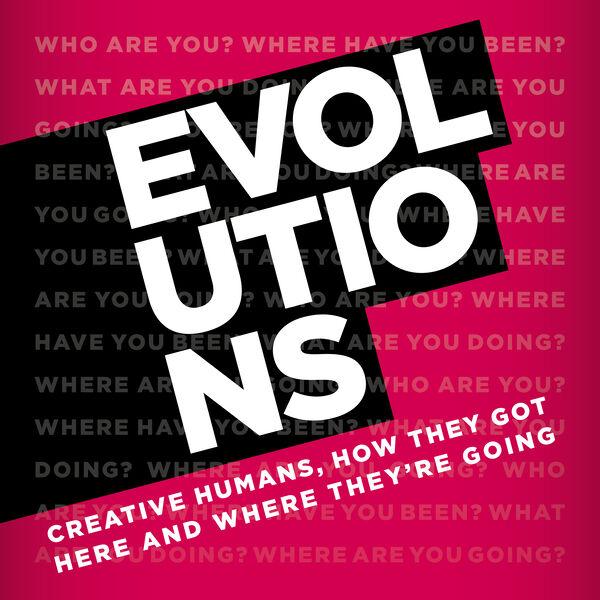
I was frustrated at the time it took to get work “out there” so he suggested I might do it myself.
I researched the short story market, as well as potential gaps in provision for audio content and I thought a combination of meditative and escapist character-based short stories, narrated in the style of a bedtime story, might work.
The response has been really encouraging. The audience has been very frank about what’s working and what isn’t, the real-time feedback giving me an opportunity to modify the style and content of each new story. I’m also keen to interact with the audience, using names for characters taken from contents pages and maybe asking for suggestions on story ideas and destinations.
It’s great to know, too, that these stories are temporarily distracting people from the stresses of their day and, in some cases, helping them sleep. I’m hoping my voice doesn’t have the same effect during face-to-face conversations, when we return to the “real” world!
In November your latest play GULL was read online by the team at The Far Away Plays. We think the Far Away Plays have been one of the highpoints of creative activity in Wales during the Pandemic. Have you had an opportunity to listen to any of the other Far Away Plays, play readings? And how was it to have your latest play produced on Zoom?
GULL was originally scheduled to be performed at WMC’s Ffwrnes Scratch night in March 2020, but then the world plunged into chaos. So I was thrilled when The Far Away Plays chose it for one of their online performances late last year. Their commitment to getting work out to online audiences, as well as dealing with all the logistical stages in between, has been immense.
I was also excited to be able to cast three incredible RWCMD alumni. Luke Nunn, Cecilia Appiah and Meredith Lewis were just some of the standout actors from 2020 and it was a real privilege to witness their brilliantly instinctive and nuanced performances, especially given the limited time they had to rehearse.
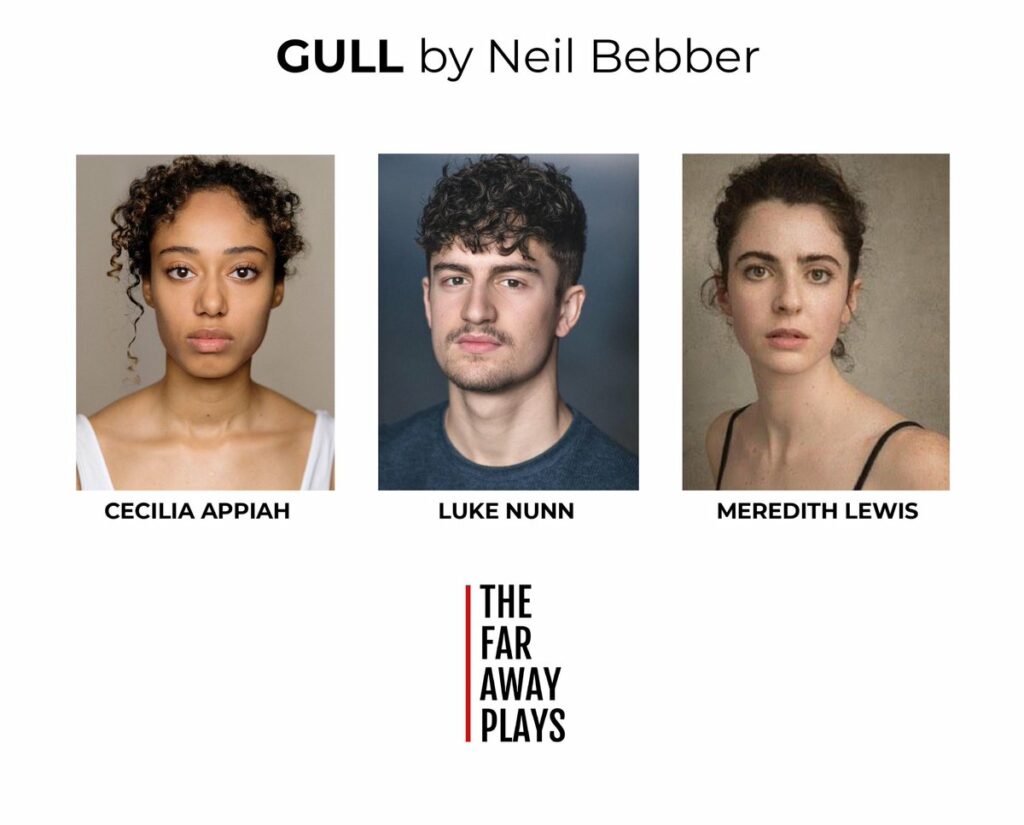
The director James O’Donnell also deserves a special mention. Having put a callout on social media for a director at late notice, James answered the call. The way he was able to take a potentially static medium and turn it into such a dynamic performance was miraculous. I always get really nervous before any production of my work, but it was clear within minutes that GULL was in safe hands, so I was actually able to sit back and enjoy it!
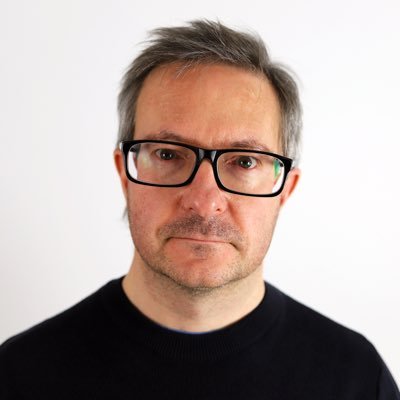
I’m waiting to hear from FAP if there’s a recording I might be able to share with all of the Artistic Directors who weren’t able to make it, because, as good as it was to see the work performed online, this play would (and this team!) clearly work brilliantly on stage.
There are a range of organisations supporting Welsh and Wales-based writers, I wonder if you feel the current support network and career opportunities feel ‘healthy’ to you? Is it possible to sustain a career as a writer in Wales and if not what would help?
“Healthy” might be a misleading term. The opportunities are available, but I wonder how writers are made aware of them. For opportunities, my go-to is BBC Writer’s Room Opportunities page. Then I check London Playwrights, which is another brilliant resource. I’m not sure if there’s a central database for opportunities in Wales. If not, it would be great to have one, where all aspects of writing were covered, plays, films, TV, etc.
Also, there are a number of theatres offering writer’s courses and residences, but there are rarely the resources available to sustain the momentum, once they’ve happened. I’ve been on three writer’s courses and one residency and none of these led to a tangible, ongoing relationship with the respective theatres.
In terms of sustaining a writing career, I think it’s important to diversify. I’m lucky to also be a freelance copywriter and graphic designer, but, even if I was commissioned to write three plays a year, the income generated wouldn’t be enough to sustain a family, mortgage and other regular day-to-day commitments. From what I can gather, to make any sort of living, TV writing seems to the way forward. Ideally I’d like to be able to do a bit of everything, though, as I’ve been lucky enough to so far.
If you were able to fund an area of the arts in Wales what would this be and why?
I think a TV writing academy would be a valid investment now. As Wales becomes used increasingly as a destination for production, and companies like Bad Wolf continue to thrive, a joined up, sustained TV writing “lab” could help nurture home-grown talent and ensure Wales was increasingly self contained, moving forward. Especially given the increase in demand for content from online providers like Netflix and Prime.
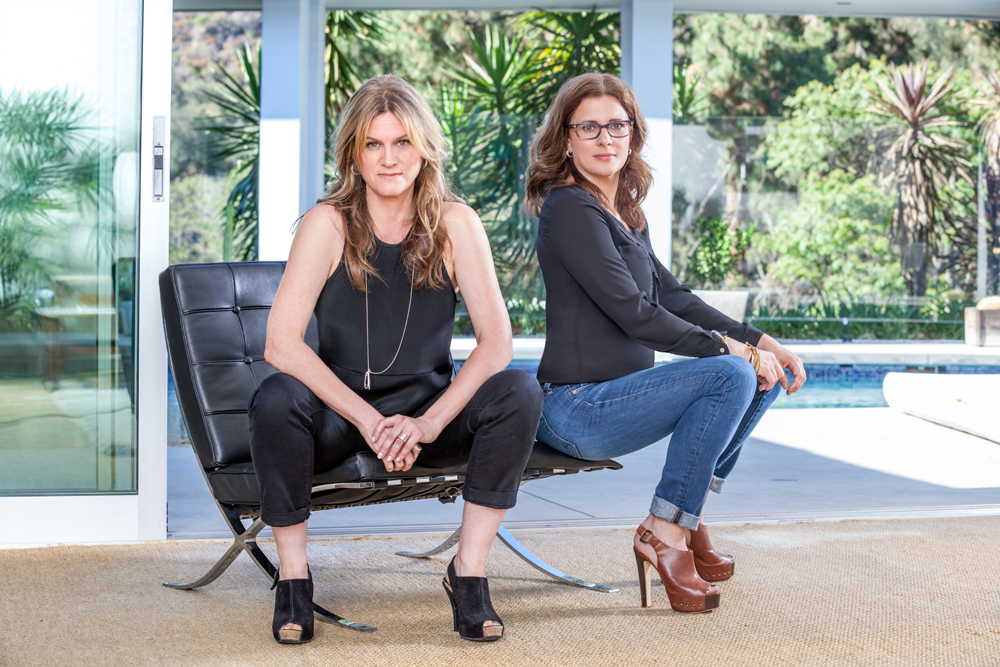
What excites you about the arts in Wales?
Diversity. The sheer extent of opportunities to make and view art for a country with a reasonable small population. I’m hesitant to use the term, “punching above its weight”. Oh, too late. I have.
And then there’s always the occasional parallel universe curveball of one of Tactile Bosch’s performance art nights. That’s what first made me realise I was living in a capital city. Ah, I miss Kim Fielding. What a lovely man.
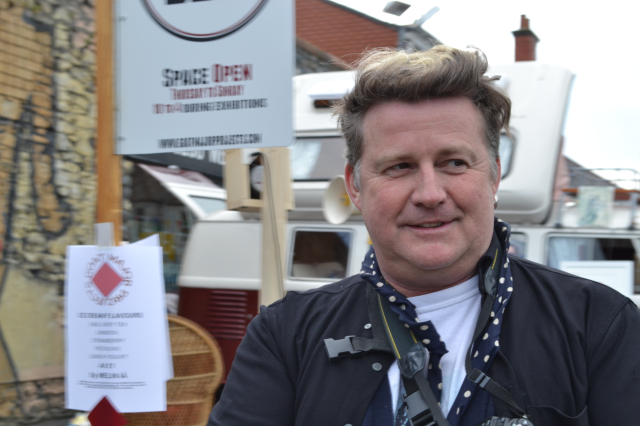
What was the last really great thing that you experienced that you would like to share with our readers?
There are so many things that have either left me speechless, laugh uncontrollably or made me cry, sometimes all at the same time.
I remember sitting down in my office (in the middle of the first lockdown), with headphones on, to watch Complicite’s “The Encounter”, and feeling within minutes as if I’d been transported to another world, by both the performance and its remarkable aural soundscape. Not sure if it’s still available to view online, but there’s more, here:
Charlie Kaufmann’s “I’m Thinking of Ending Things” (on Netflix), whilst sometimes being incomprehensible, felt like a pure artist’s vision, unimpeded by the demands of people-pleasing. Maybe the best art is selfish. And this felt like that. But in the best possible way.
And no conversation (I say conversation, though this has all been a bit one way) with me goes without a music mention. The Dandy Warhols’ 13 Tales from Urban Bohemia has been my favourite album for years. And at the end of last year, they performed a live stream of it, in its entirety, for the first time. For that hour, I was there, front and centre, dancing like a kid in a sweet shop. The sweets being the songs. But not in jars. Obviously.
Anyway, that’s three. Because there’s never any shortage of great things to share.
Thanks for your time
And thank you for this brilliant opportunity to ramble.

